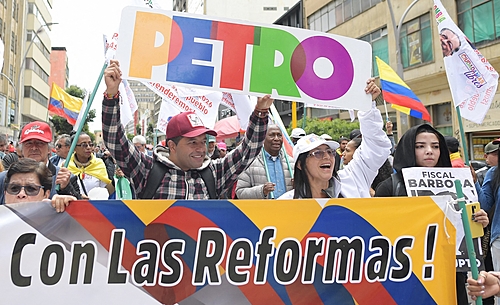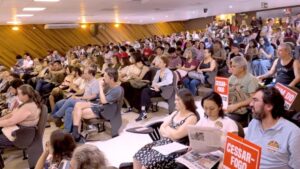
Thousands of Colombians took to the streets in different regions of the country this Wednesday (07) to support the government of President Gustavo Petro. The call made by popular movements and parties takes place amid a crisis experienced by the leftist representative, classified by the government as an attempt at a “soft coup”.
According to the government, marches in favor of Petro were recorded in at least 200 different cities, including the main ones in the country like Medellín, Cali, Barranquilla and the capital, Bogotá.
It was there that Petro, accompanied by Vice President Francia Márquez and some ministers, participated in the act and addressed a crowd of supporters gathered in Plaza de Bolívar. The president again denounced an attempted coup against his government and said that the people were mobilizing to demand the approval of health, labor and social security reforms presented by the government to Congress.
“There are people who still don’t understand what last year’s election decision meant. They think it was a delirium that has already passed and left a president abandoned in the palace. follows with the president and both want to put into practice the program that was elected”, he said.
::Chomsky, Corbyn, Correa: Intellectuals and politicians from 20 countries denounce coup in Colombia::
The crisis experienced by the government began in April, when some center and center-right parties broke with the coalition that took Petro to the Presidency, the Historic Pact. The movement took place in the midst of opposition attempts to impose obstacles to the government’s reforms in the Legislative and forced the president to reformulate his cabinet of ministers.
With the internal split in the coalition, Petro was left with no base of support to approve the proposed reforms. In addition, lawsuits by the Public Prosecutor’s Office and the Attorney General’s Office began to be filed against members of the Historic Pact, which led the government to clash with the judiciary after denouncing that the cases involved “politicization of justice”.
During his speech this Wednesday, Petro sought to link his government’s reforms to the political project presented by him in the campaign and said he would be open to discussing changes in the proposals, “but none that affect the guarantees of the people’s rights.”
“We are going to respectfully demand that Congress approve these reforms, but that they know that respect is not weakness, they know that the people have not abandoned the government, that the people are still standing in the fight for justice and peace,” he said.
‘They want to arrest me and carry out a coup in Colombia’
The last case that amplified the crisis in the government occurred last week, when Petro demanded the resignation of his chief of staff, Laura Sarabia, and of the Colombian ambassador to Venezuela, Armando Benedetti, who had been his head of the electoral campaign.
Announced last Friday (02), the dismissals of Sarabia and Benedetti come amid threats exchanged by both involving alleged wiretapping, theft of dollars and campaign donations. The MP has already announced the opening of investigations.
Faced with the reaction of Justice, Petro said that the government did not commit any irregularity and that he would not accept being “blackmailed”.
This Wednesday, in front of supporters, the president again denounced the coup attempt, blaming sectors of the press of “big capital”. The president even said that the plan would involve arresting him and replacing him with a president “without electoral and popular support”.
::In favor of social reforms, Petro calls for ‘permanent struggle’ from Colombians::
“They want to build distrust in the popular bases with a first objective of blocking the reforms in Congress and bringing Congress to the knees of big capital. A second objective, once the reforms are overthrown, they think of […] do the same as they did in Peru, that is, take the president to prison and replace him with a president who was not elected,” he said.
Petro also stated that “this is called a soft coup, a coup against the popular will”. “Pedro Castillo [ex-presidente peruano] was alone, but here we say to those who are plotting this strategy: Petro is not alone. If they dare to violate the popular mandate, the people of Colombia will come out of every corner of the country to defend it”.
New Ambassador to Venezuela
In the midst of the crisis and after the departure of Benedetti, the Colombian government has already appointed a new ambassador to Venezuela. Milton Rengifo Hernández has already received approval from Caracas and should take office shortly.
A former employee of Petro when the president was mayor of Bogotá, Hernández has no diplomatic career. He was Undersecretary for Local Affairs and Citizen Development during Petro’s tenure in the capital and currently holds the position of director of community management for the public company Acueducto y Alcantarillado de Bogotá.
::Colombia’s president dismisses chief of staff and classifies new crisis as ‘soft coup’::
Furthermore, according to Colombian broadcaster Caracol TV, Henández was critical of the government of Venezuelan President Nicolás Maduro. In a series of tweets retrieved by the broadcaster dating from 2017, the new ambassador accused the neighboring country’s representative of “corruption” and criticized him for his action in the face of opposition protests that took place that year and became known as “guarimbas”.
Despite criticism for his lack of experience and for his comments on Maduro, Rengifo Hernández was praised by Colombian Foreign Minister Álvaro Leyva, who called him “a very prepared, very serene man who will make a great ambassador.”
Editing: Thales Schmidt
Source: www.brasildefato.com.br

